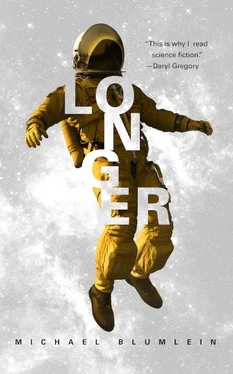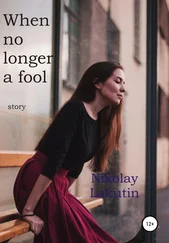What did this mean? As far as Cav was concerned, only that the Ooi defied spectroscopic definition. He could think of a number of reasons why. None of them disabused him of the notion that it was living. Its signal varied. So what? Variability was a defining feature of living systems, which characteristically showed peaks and valleys of activity, stochastic swings within a range. Not usually at the level of small molecules, but even there, conceivably. He guessed there was a pattern, which they’d observe if they waited long enough.
“We should tell Gleem,” said Gunjita.
“Tell them what?”
“What we’ve found so far. Send them our measurements. See what they come up with.”
“It’s a little early for that. We’ve barely gotten started.”
“They’re waiting,” she said.
“Let them.”
“The Ooi isn’t yours, Cav. Technically speaking, it’s theirs.”
“It’s no one’s.”
“The asteroid’s theirs.”
“So we’ll send them our analysis of it. That’s what they’re interested in. Can they make money from it? I’m afraid they’ll be disappointed.”
“We need to say something about the Ooi.”
“We have nothing to say.”
“How about this: we’re busy. The great man is thinking. We need more time. Leave him alone.”
“Perfect.”
“You’re living in a cave,” she said. “They’ll send someone if we don’t communicate.”
* * *
The following day they added IINS spectroscopy to their testing, repeating it three separate times, with the same confounding results. Cav wanted to do a fourth. Gunjita put her foot down.
“You love to do this,” she said.
“Do what?”
“You know we’re going in there.”
“Eventually.”
“You’re procrastinating.”
“Due diligence, Gunjita.”
“Delayed gratification, Cav.”
She was right.
“I’m suiting up,” she announced.
He nodded. It was time. Fact was, he couldn’t wait.
“I’ll be right behind you, sweetheart,” he said.
The big concern, of course, was contamination. Human beings, even freshly cleaned, plucked, shaved, deodorized, debugged, and antisepticized, were not germ-free. Germs, quasigerms, and pieces of germs in the form of embedded fragments of genetic code, and other, nonembedded pieces in free-floating form, and still others in the process of active mutation to create new germ pieces, germs of the future, lived in, on, around, and through the thing called human. A human being was fertile soil, a Garden of Eden for nonhuman organisms, simulacrum of the Earth itself, built over eons through trial and error and slow accretion of materials, including living materials. A body was a magnet for all manner of life, bringing it together, binding it energetically, holding it in balance. A laboratory for experimentation, a friendly host, a breeding ground, a passenger, as well as a carrier, and notoriously good at spreading disease.
Also good at attracting disease: life attracted life.
And good at warding it off. Repelling invasion. Usually very good at this on Earth, where the invaders, as a rule, were familiar, and used familiar tactics.
The Ooi came from outer space.
“I know what you’re thinking,” said Gunjita. “Please don’t.”
They were standing at the door to the cargo bay, suited and gloved, helmets in hand.
“Don’t what?”
“Take off your helmet when we’re inside. Or your gloves.”
“I don’t intend to.”
“That’s good to hear. And your contrarian streak? The side that loves to ad-lib?”
“It’s under control.”
“Also good.”
“Honestly? I’m not worried. I don’t sense we’re at risk. Not bodily. But the reverse … if we harmed it? Unconscionable. I can’t imagine anything worse. Until we know more, a lot more, I’m not willing to take that risk.”
She was cheered to hear this. But like every silver lining, there was a cloud attached. What did it mean for the future of this little project of theirs, this little side job—delving into the riddle of the ages, the burning question on every stargazers’ mind since the dawn of time: Are we alone in the universe, is there other life?—for one of the lead scientists to claim he had “a feeling” they weren’t at risk?
Helmets on, they entered the bay. The asteroid floated a couple of feet above the floor, held in place by bungies. It was charcoal-black, its surface angular, sharp-edged, and irregular, all save one small section that looked engineered. Four narrow ledges rising not far from the Ooi, like miniature stairs. As though carved in the rock. As though purposeful.
Gunjita quickened her pace. She refused to believe it.
“Slowly,” Cav whispered.
She stopped at arm’s length from the pint-sized stairs, just to the right of the Ooi. Moments later, Cav joined her. They were stabilized by Velcro soles on their boots. The Ooi appeared unaware of their presence. If aware, it appeared unperturbed.
“Someone’s playing a joke on us,” she said.
“Mother Nature. She loves jokes.”
“You think they’re random?”
“Not random. But not deliberate.”
“I hope not.” She leaned closer. “You think the rock could fracture just like this? In just this pattern?”
Cav had his eyes on the Ooi. He suppressed the thought that it was responsible for what they were seeing.
Gunjita answered herself. “Of course it could.”
He nodded.
“Big universe,” she added.
“Huge.”
She wasn’t entirely sold. Objectivity was key. But the more she looked, the less the stairs resembled stairs, the more they flattened out, or else deepened, shifting shape, becoming other shapes, other patterns, as though her vision had become unglued.
She took a step back and blinked several times. Slowly, the stairs reconstituted themselves. But they looked ever so slightly different. The lines looked harder. The dimensions more chiseled. More muscular. As if a new way of seeing were asserting itself in her. A new spatial awareness.
Interesting.
She glanced at Cav, who was transfixed by the Ooi. She knew what he was thinking. She could tell by the rapturous look on his face. Seeing it, she understood that she’d been overly ambitious. Had asked too much of herself. Objectivity was at best an approximation. Subjectivity was impossible to fully control or suppress. Its source in this case was a photo of a snow-capped peak she’d taken years before, and which, recently, had somehow wormed its way on-screen attached to a smiling, apple-cheeked Tyrolean face urging her to book a repeat visit. She’d seen the photo that very day.
“I was thinking about that trip we took to the Alps,” she said. “Do you remember? We were collecting extremophiles. A storm nearly knocked us off the mountain. Fortunately, the Swiss had conveniently carved steps into the rock face.”
He remembered. “A scary experience.”
“Unforgettable.” In fact, she’d forgotten until the photo. A memory unburied by spam. “We see what’s familiar. Experience thwarts objectivity. It interferes.”
“And informs.”
“Yes. Informs and interferes.”
“A balance,” he said. “Like everything. Take a look at this.” He was pointing to an arm of the Ooi. It was shaped like a camel’s hump. On the opposite side was another hump-shaped arm, slightly wider and also slightly thicker. “Symmetrical, you think?”
“Almost.”
“Yes. An almost symmetry.”
Symmetry implied organization, a cornerstone of life. Though not necessarily life. Atoms and molecules were extremely well organized. On a larger scale, so were galaxies.
“It’s getting energy from somewhere,” he said.
Читать дальше











